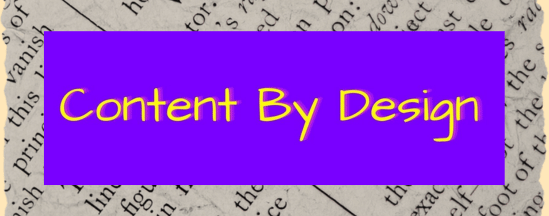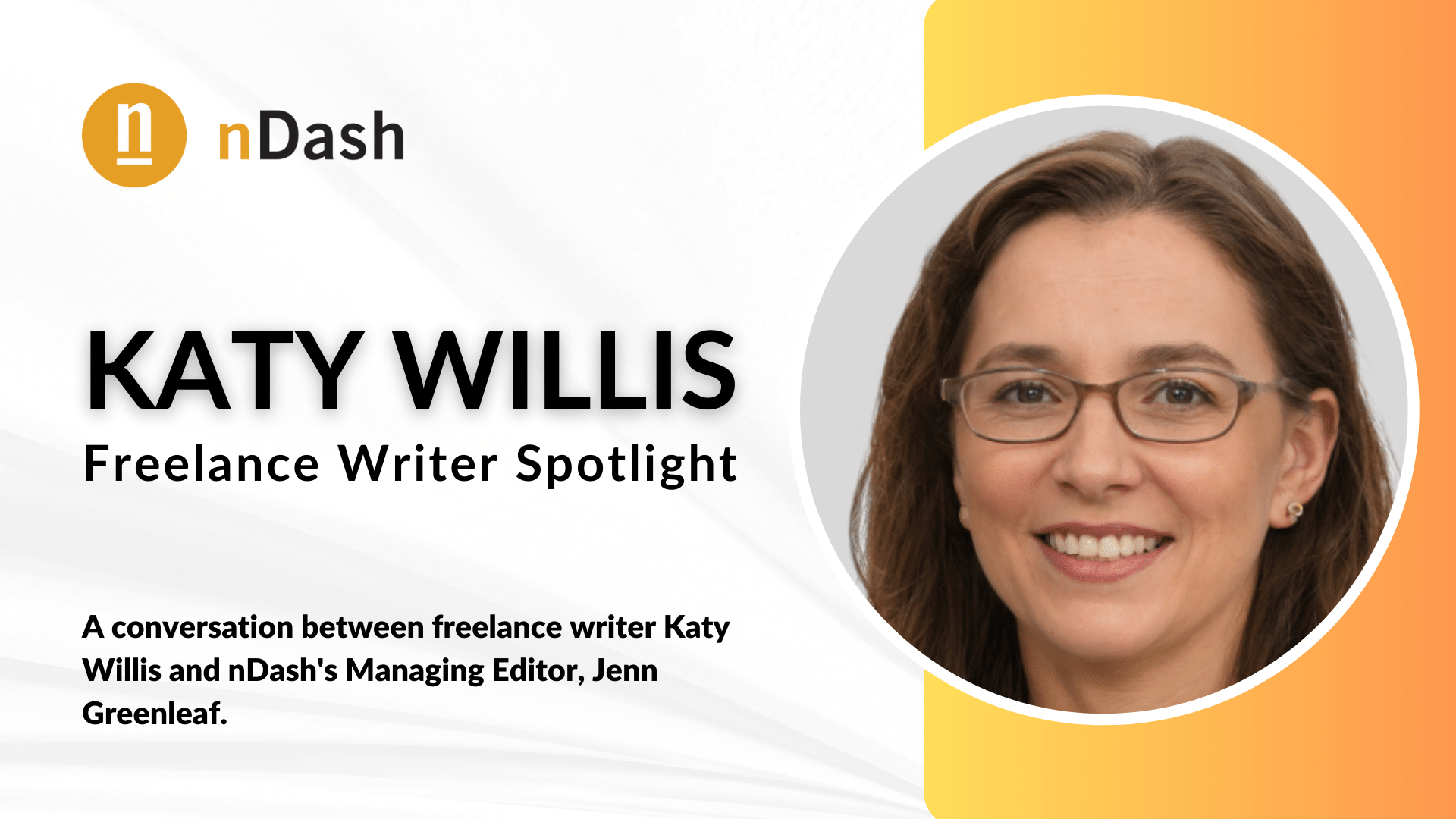nDash’s Managing Editor, Jenn Greenleaf, talks to Katy Willis about her background as a freelance writer, project manager, and more!
Background: The Highlights
I connected with Katy three years ago when she was looking for a freelance writer to support one of her clients. I’ve always been impressed with her ability to manage and multi-task. So, when the opportunity arose for me to use her freelance writing talents, I couldn’t pass up the opportunity.
Katy’s background includes being a project manager, freelance writer, and small business owner. Here’s a snippet from her LinkedIn profile where she highlights the services she provides:
“Since 2002, I’ve been honing my craft, immersing myself in SEO, big data, SERP trends, and content creation. I’m a dab hand with WordPress, run several of my own blogs and websites, and know Google’s Search Engine Evaluator manual like the back of my hand.”
Katy’s Experience as a Business Owner and Project Manager

Jenn: It’s been almost three years to the day since the first time we exchanged messages about freelance writing. Back then, you were managing content for a VPN review website and looking for another strong freelance writer to add to your team. Would you say that tech writing is your preferred niche, or have you since switched gears?
Katy: It’s incredible to think that three years have passed since we first connected! Tech writing holds a special place in my heart. I absolutely love it because it’s a constantly evolving field that keeps me on my toes and offers endless opportunities to learn. As a neurodiverse individual, I find that tech writing suits me well, as it allows me to fully engage my unique strengths and perspectives in a challenging and stimulating environment.
Over the years, I’ve worked extensively with tech and SaaS content, which has only deepened my passion for the niche. At this point, I have no plans to switch gears. I find immense satisfaction in staying up-to-date with the latest technology trends and sharing my knowledge through my writing while also embracing the advantages of my neurodiversity.
Jenn: Speaking of switching gears, I notice that you’ve owned Real Self-Sufficiency for nearly eight years – is this a passion project for you and Rebecca Britton? Or is your goal to write about green living full-time?
Katy: Real Self Sufficiency is a passion project. I write about my organic growing adventures. I’m a techno-hippie, master gardener, and master herbalist, and growing my own food, raising my livestock and pets, and creating my own remedies is the other side of me from the serious B2B tech writer.
I find that balance quite fulfilling.
Immersing myself in nature brings pure joy, and being able to write about it helps me combine my two great loves—writing and Mother Nature. While I don’t necessarily plan to write about green living full-time, I am committed to maintaining Real Self-Sufficiency as a way to express my passion for sustainable living and share valuable insights with others who share the same interests.
Jenn: I notice your background also includes being a project manager for several companies. Could you please tell me a little bit about that and how you managed your freelance business – Content By Design – alongside those tasks?
Katy: My background in project management has definitely been an integral part of my professional journey. As a freelance project manager, I was responsible for overseeing a range of tasks, such as coordinating teams, ensuring the timely completion of projects, and maintaining communication with clients. Thanks to my neurodiversity, I was able to utilize my unique strengths and perspectives to manage these responsibilities effectively.
Content By Design, my freelance business, is closely connected to my project management experience. In fact, content management has been a significant aspect of my freelance work. Balancing my freelance business alongside project management tasks was made possible by leveraging the skills I gained in both roles, as well as drawing on the advantages of my neurodiversity to stay organized and focused.
By combining my project management background with my passion for content creation, I’ve been able to successfully manage Content By Design and offer valuable services to my clients.
Jenn: Speaking of Content By Design – your background as a freelance writer is quite extensive. I notice you also list rates on your website for specific services. Did you find it challenging to determine those rates? What advice would you give another freelance writer who is struggling with this?
Katy: I actually don’t list my rates on my website anymore. I’ve recently overhauled the site. Largely because it tried to offer too many things to too many different people. So I narrowed my site’s scope to focus on SaaS, martech, B2B, and marketing content. Do I also love, love, love to write about growing things and canine nutrition? Yes, absolutely. But, even though I’m an expert in those fields, it’s confusing to potential clients to see those skills and offerings mixed in with the techie stuff.
As for rates, I originally had them listed for the sake of transparency but eventually decided against them. Because how much I charge depends on the assignment. The length, complexity, and scope, among other things. And listing rates won’t give you any wiggle room. If you go at your top price, you turn off potential clients with simple assignments you could tackle for a lower rate. If you put your floor price on your site, then you can’t negotiate a higher price for work that requires more research, time, and effort.
The Rest of nDash’s Discussion with Katy Willis
 With over twenty years of experience, she provides high-quality content in the following industries:
With over twenty years of experience, she provides high-quality content in the following industries:
- Technology
- Business
- Health & Wellness
- Lifestyle
- Science & Medicine
Jenn: Can you tell me about how becoming a freelance writer for nDash became part of your journey?
Katy: I remember seeing nDash back in the early days and contemplating signing up, but I got flooded with work (not a bad thing) and honestly forgot all about it. Then you and I connected, and as you grew into your role as managing editor, I kept seeing all the awesome things you were sharing about the happenings at nDash and the valuable content you guys were putting out. And, as I moved back into writing full-time from content management, I did some more research on nDash, thought it looked like it might be a solid option, and took the plunge.
I love not having to pitch unless I want to. Brands and editors come to me. Plus, if I do want to pitch, I know I’m pitching to companies who are open to working with freelance creators. Which I’m much more comfortable with than having to send stone-cold pitches.
Jenn: It looks like you have quite a bit of experience with multi-tasking and managing big projects. What advice do you have for others who are struggling with this?
Katy: I really don’t have all the answers here. Remember, I’m neurodiverse, so it took me a long time to find a system that really works for me. But maybe my top tips can help others, whether they’re neurodiverse or neurotypical.
I’d also say try out these tips and others and then discard anything that doesn’t work for you. Don’t try to conform to a structure or activity that doesn’t help you. Try it. Doesn’t work? Skip it. Don’t feel bad about not being able to make something work. We’re all different. Be patient and kind to yourself, and you’ll find a system that works.
Prioritize tasks:
Identify the most important and time-sensitive tasks, and focus on completing them first. Use a prioritization method like the Eisenhower Matrix to categorize tasks based on urgency and importance, helping you decide what to tackle first.
Break projects into smaller tasks:
Divide larger projects into smaller, manageable tasks. This makes it easier to focus on one task at a time, track your progress, and maintain momentum.
Set realistic deadlines:
Establish achievable deadlines for each task or project. This helps you stay on track and avoid last-minute stress. Be sure to consider potential obstacles and allow buffer time for unforeseen delays.
Use productivity tools:
Leverage tools and apps like task management software, calendars, and time-tracking apps to help you stay organized, manage your to-do lists, and monitor your progress. I personally love Monday.com. It’s so simple and intuitive (and free).
Avoid multitasking (unless it’s how you thrive):
Though it might seem counterintuitive, multitasking can actually decrease productivity. Focus on completing one task at a time, allowing yourself to fully engage with the work at hand before moving on to the next task.
Establish routines:
Create a daily or weekly routine that incorporates designated times for work, breaks, and personal activities. A consistent routine helps you maintain productivity and prevents burnout.
Communicate:
Maintain open communication with your team and clients, providing updates on progress and addressing any issues that arise. Don’t be afraid to say that you need more time. Don’t make up an excuse. Be honest. And do it as soon as you can.
Learn to say no:
I cannot stress how important this is. Until I learned to do this, I’d stress myself out so much that I’d cry. Or I’d be so stressed and not get enough done that I’d have to pull all-nighters. Recognize your limits and be realistic about the amount of work you can handle. If you’re already at capacity, say no to additional projects or requests to avoid compromising the quality of your work or overextending yourself. Burnout is awful and demoralizing.
Reflect and adjust:
Regularly assess your productivity and workload, identifying areas where you can improve or make adjustments. This helps you stay agile and adapt your strategies as needed to optimize your project management skills.
Jenn: What’s the best advice you’ve ever received as a freelance writer?
Katy: Know when to say “no.” Like many freelancers, early in my career, I’d accept any assignment that came my way, however bad the pay or the conditions. This means you end up stuck in an endless rut of awful, low-paying assignments and horrid working conditions that crush your soul and leave you too exhausted and demoralized to look for better clients when you’ve met your minimum income goal for the day.
A friend who’d been doing this much longer than me woke me up. She told me to stand up for myself and do better. That I needed to stop underselling myself, drop some of the gigs I really hated, and start to build partnerships with clients who valued my skills and whom I was excited to work with.
What a lightbulb moment! It was scary because it was difficult to get out of that desperate feast-famine mindset. But boy-howdy am I glad I did!
Jenn: Conversely, what is the best advice you’ve given to a freelance writer?
Katy: Adopt an abundance mindset. Look, there’s always room for great content creators. Is it difficult to build new client relationships? Yes, absolutely, but don’t be miserly. Be kind. Be gracious. If you see a job that you’re not a good fit for, tag someone you know that excels in that niche. Build relationships with other writers, not just clients. Share your knowledge; share leads you don’t want to pursue. A little kindness goes a long way. Not only because you could literally make someone’s year by helping them land a gig that helps them dig out a hole you didn’t know they were in. But it’s not all altruistic. Do it to be kind to others, but also because they may return the favor one day.
Remember, abundance, not scarcity. If you’re genuine and good at your craft, there is always room for you. Connect, build real relationships, spread a little kindness, and don’t be afraid to share.
Jenn: How has your background in project management helped support your freelance writing career?
Katy: My goal is to partner with clients for many years, and a project management background helps me achieve that. I am thankful to have built relationships with clients that have lasted many years. Here are a few of the skills that transition from project management to writing:
- Time management and organization: As a project manager, I had to ensure that tasks were completed on time and within the project timeline, which required a high level of organization. This experience has translated well into my freelance writing career, as I can effectively prioritize tasks, set deadlines, manage my workload, and keep track of client requirements, deadlines, and progress on each project, ultimately delivering high-quality content in a timely manner.
- Communication: In project management, clear and effective communication with clients and team members is essential. As a writer, strong communication skills have helped me maintain strong relationships with clients by understanding their needs, providing regular updates, and addressing concerns promptly.
- Problem-solving: When you’re a project manager, unexpected issues frequently arise, requiring quick and effective solutions. This skill has been invaluable in my freelance writing career, as I’m able to adapt to changes, address feedback, and overcome challenges to deliver exceptional content.
- Teamwork and collaboration: Working with diverse teams has taught me the importance of collaboration and adaptability. As a freelance writer, I often collaborate with clients, editors, and other writers, and my project management background has made it easier to navigate these relationships successfully.
Jenn: What characteristics of a freelance writing assignment excite you the most? What gives you pause and results in you turning down an assignment request?
Katy: There’s no question that I’m selective about the assignments I accept nowadays. I’ve been doing this for a long time, so I’ve learned a lot along the way, including knowing when to accept an assignment and when to decline it.
Yes, there are red flags, but there’s also just knowing when you’re not the right person for an assignment. In that case, you still have the opportunity to add value (and do a kindness) – if you’re not the right fit, do the client a solid and refer them to a writer who might be a better choice.
Things that make me say “yes, please”:
- Clear briefs and project scope: Having a well-defined brief and a clear understanding of the project scope is crucial. It helps me know exactly what the client’s looking for, which allows me to craft content that meets their expectations and requirements. It also streamlines the writing process and minimizes potential misunderstandings, wasted time, and revision requests.
- A client who encourages questions: I appreciate clients who are open to answering questions and providing guidance when needed. This not only helps clarify any uncertainties but also fosters a strong working relationship built on trust and open communication.
- Open dialogue and collaboration: A project where the client values collaboration and maintains an open dialogue throughout the process is highly motivating. This level of engagement allows for the exchange of ideas, constructive feedback, and a shared commitment to creating the best possible content.
- An assignment with a purpose: I am particularly drawn to writing assignments that serve a greater purpose, whether it’s educating readers, solving a problem, or making a positive impact on the target audience. Knowing that my work contributes to a meaningful goal inspires me to put forth my best effort and create content that truly resonates with readers. Plus, there’s already plenty of content “just because” online – I don’t want to contribute to that.
Things that make me likely to walk away:
Unclear expectations:
If the client can’t provide a clear content brief or articulate their needs, it becomes challenging to deliver content that meets their expectations. In such cases, the likelihood of miscommunication and dissatisfaction increases, and it’s unlikely to have a good outcome or a lasting relationship.
Unreasonable deadlines:
If a client requests an unrealistic deadline that would require compromising on the quality of work or negatively impacting my existing commitments, I might have to decline the assignment. Maintaining the quality of my work and honoring commitments to other clients are critical to my continued success and good reputation as a freelancer. Of course, if I can help meet an urgent deadline, I always will. My existing clients often come to me when another writer has dropped the ball and needs urgent assistance.
Inadequate compensation and unpaid trials:
Fair compensation is essential for any successful working relationship. If a client is unwilling to provide appropriate compensation for the work, I may have to turn down the request, as it’s crucial to value my expertise and time. And I’ll never complete an unpaid trial assignment. That nonsense should not still be happening. You can see my samples, you can communicate directly with me, and I’ll gladly hop on a call. But I won’t work for free.
Ethical concerns:
If the subject matter or purpose of an assignment conflicts with my personal values or professional ethics, I would have to decline the project. It’s important for me to maintain my integrity and only take on work that aligns with my principles.
Insufficient expertise:
If an assignment requires specialized knowledge or experience that I don’t possess, it might be in the best interest of both parties for me to decline the request. As I said above, I’d much rather recommend another writer who is better suited to handle the project and ensure the client receives the highest quality content.
Thank you for talking to me about all things content and your journey as a freelance writer!
Work with Katy Willis on nDash Today!
Do you have a project that aligns with Katy’s expertise and experience as an agency copywriter? Check out her writer profile to learn more about how her background can help you level up your content strategy: Katy Willis.
